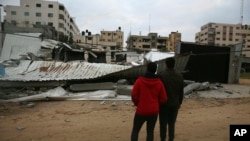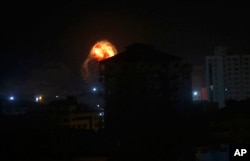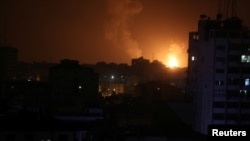Israeli warplanes on Friday struck about 100 Hamas targets in the Gaza Strip in response to a rare rocket attack on Tel Aviv. Rocket fire persisted throughout the morning, setting the stage for possible additional reprisals.
The army said that its targets had included an office complex in Gaza City used to plan and command Hamas militant activities, an underground complex that served as Hamas’ main rocket-manufacturing site, and a center used for Hamas drone development. There were no reports of casualties.
The late-night attack on Tel Aviv, Israel’s densely populated commercial and cultural capital, marked a dramatic escalation in hostilities. It was the first time the city had been targeted since a 2014 war between Israel and Gaza militants.
Hamas denied responsibility for the initial rocket attack, saying it went against Palestinian interests. But after a preliminary investigation, Israel said it had concluded that the militant group was behind the attack.
Following the Israeli airstrike, several additional rounds of rocket fire were launched into Israel. The military said several rockets were intercepted by its air defense systems, and there were no reports of injuries.
Egyptian mediators
The fighting broke out as Egyptian mediators were in Gaza trying to broker an expanded cease-fire deal between the bitter enemies.
The initial blasts from the Israeli airstrikes in southern Gaza were so powerful that smoke could be seen in Gaza City, 25 kilometers (15 miles) to the north. The Israeli warplanes could be heard roaring through the skies above Gaza City.
Israel and Hamas have fought three wars since the Islamic militant group seized power in Gaza in 2007. Smaller flare-ups have occurred sporadically since Israel and Hamas fought their last war, in 2014.
Israeli election, Hamas criticism
The sudden outburst of fighting comes at a sensitive time for both sides. Israel is holding national elections in less than a month. Netanyahu is locked in a tight fight for re-election and could face heavy criticism from his opponents if he is seen as ineffective against the militants.
Cabinet Minister Naftali Bennett, a hard-line rival of Netanyahu’s, called on the prime minister to convene a gathering of his Security Cabinet and demand the army “present a plan to defeat Hamas.”
Likewise, Hamas has come under rare public criticism in Gaza for the harsh conditions in the territory. An Israeli-Egyptian blockade, combined with sanctions by the rival Palestinian Authority and mismanagement by the Hamas government, have fueled an economic crisis in the territory. Residents have little desire for another war with Israel.
Earlier Thursday, Hamas police violently broke up a small protest over the harsh living conditions.
Brig. Gen. Ronen Manelis, the chief Israeli military spokesman, said the army had been caught off guard by Thursday night’s rocket barrage and had no advance intelligence.
Israel holds Hamas responsible for all fire coming out of the territory. Hamas possesses a large arsenal of rockets and missiles capable of striking deep inside Israel.
But with Gaza’s economy in tatters, the group has been seeking to preserve calm.
Militants deny Tel Aviv attack
Hamas denied responsibility for the attack on Tel Aviv, saying the rockets were launched when the group’s military wing was meeting with the Egyptian mediators.
In an unusual step that indicated Hamas was attempting to prevent further escalation, the Hamas Interior Ministry said the rocket fire went “against the national consensus” and promised to take action against the perpetrators.
But Israel’s military concluded that Hamas was responsible. In a statement early Friday, the army said “we can confirm” that Hamas carried out the rocket attack.
Islamic Jihad, an Iranian-backed militant group that also has a large rocket arsenal, also denied firing the rockets. Smaller factions inspired by the Islamic State group also sometimes fire rockets, though it is unclear whether they possess projectiles capable of reaching Tel Aviv.
Earlier this week, Israel struck Hamas targets in Gaza in response to rocket fire on southern Israel, near the border. Late Thursday, local media said that Egyptian mediators left the territory.






